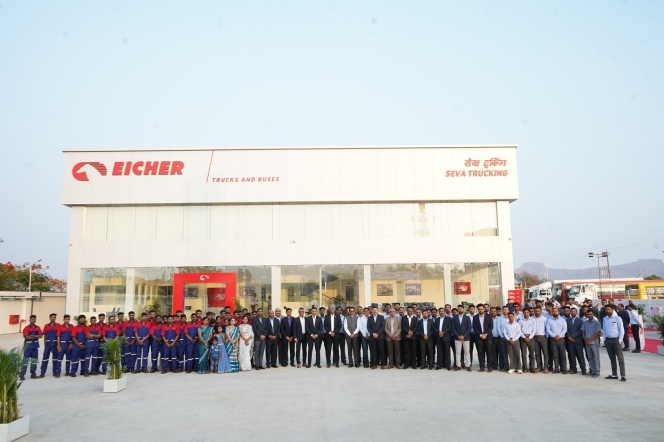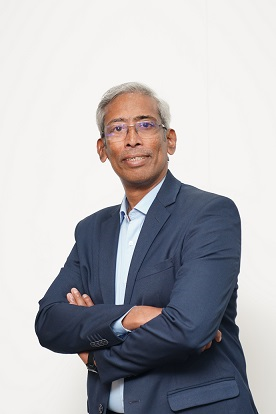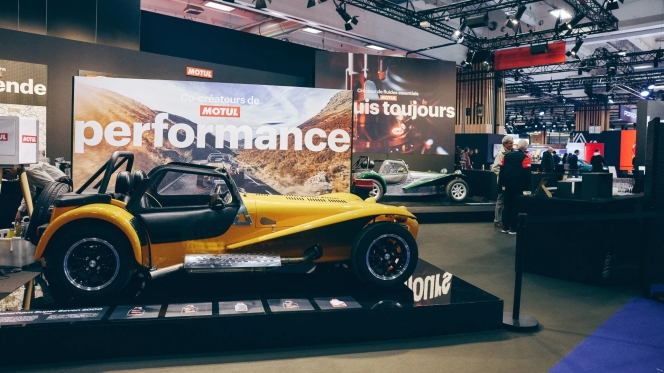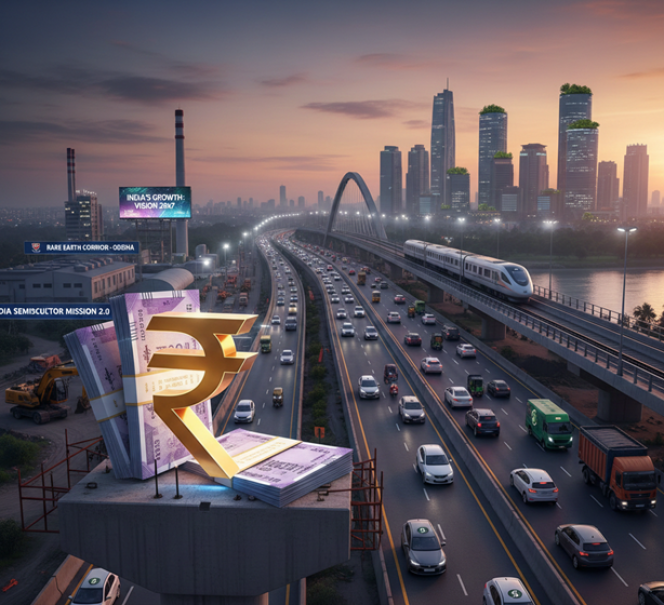VE Commercial Vehicles Digitalisation Drive Offers Smart Gains For Customers
- By Nilesh Wadhwa
- September 04, 2025

The Gurgaon-headquartered commercial vehicle major looks beyond just selling trucks and buses. The company’s focus on digitalisation and aftersales, it believes, is what the new-age customers need.
In the high-stakes world of commercial transportation, time is money – quite literally. Every hour a truck is off the road can mean missed deliveries, idle drivers, delayed shipments and unhappy customers. In India’s competitive commercial vehicle (CV) industry, the ability to minimise downtime and maximise uptime has become a critical differentiator for automakers.
For VE Commercial Vehicles, this principle has been elevated into a business philosophy. Over the past few years, the company has invested heavily in digital tools, predictive maintenance capabilities and an expanded service footprint to ensure that customers’ vehicles are running at peak performance for as many hours of the year as possible.
In an exclusive interaction with Motoring Trends, Ramesh Rajagopalan, EVP - Customer Service, Retail Excellence & Network Development, at VECV, shared his team’s work spans a network of over a thousand service points, a nationwide telematics backbone and a growing portfolio of uptime initiatives that integrate technology, training and process discipline.
Building a network
VECV’s current footprint exceeds 1,100 outlets across India, with an average of 10–12 new additions each month. This network covers the full range of commercial vehicles – from heavy-duty trucks and buses to light and small commercial vehicles.
The company’s growth is not limited to conventional CV outlets. The small commercial vehicle (SCV) network, particularly for electric models, is being built almost from scratch.
 Rajagopalan revealed that the company is “working towards creating a network of exclusive dealerships for the newly launched Eicher Pro X, designed to deliver a premium, digitally enabled customer experience. These born-digital outlets will function as one-stop destinations offering advanced product customisation, EV-ready infrastructure and seamless access to connected services. With a focus on uptime, personalisation and convenience, the Pro X dealerships will redefine commercial vehicle retail by offering a car-like, modern environment tailored to the evolving needs of today’s fleet operators.”
Rajagopalan revealed that the company is “working towards creating a network of exclusive dealerships for the newly launched Eicher Pro X, designed to deliver a premium, digitally enabled customer experience. These born-digital outlets will function as one-stop destinations offering advanced product customisation, EV-ready infrastructure and seamless access to connected services. With a focus on uptime, personalisation and convenience, the Pro X dealerships will redefine commercial vehicle retail by offering a car-like, modern environment tailored to the evolving needs of today’s fleet operators.”
“The starting point for us was to identify where we’re missing out – the ‘white spots’, where customers are already buying trucks and buses, but we aren’t present. The East and Northeast were clear gaps. We also looked at the service side: customers expect to have the nearest touchpoint for any service need, parts availability anywhere and 24x7 breakdown support,” he said.
These expectations are complicated by India’s rapidly evolving road infrastructure. With new expressways and freight corridors coming online, VECV has had to rethink its physical network, sometimes relocating facilities, other times adding new ones to stay close to high-traffic routes.
Telematics as the backbone of service planning
The decision to equip 100 percent of VECV’s BS6 vehicles with telematics was a strategic move made early in the transition to the stricter emission norms. The company shared that the BS6 trucks are far more electronically complex, with multiple sensors feeding real-time data on performance, emissions and potential faults.
Rajagopalan explained, “In BS6, any sensor failure that risks an emissions breach triggers a limp-home mode. That’s standard globally. But it can disrupt a customer’s operations if not handled quickly. We saw early on that predictive algorithms could identify error-code patterns that lead to breakdowns, allowing us to intervene before the vehicle stops.”
One example is AdBlue misuse – diluting diesel exhaust fluid with water, which can cause the vehicle to derate. Through telematics, VECV can detect the signs and remotely guide drivers on corrective steps, often via a quick video call.
This predictive maintenance model categorises alerts into three groups:
- Stop Now – requiring immediate action to prevent damage.
- Do It Yourself – where drivers can resolve the issue with guided support.
- Visit Soon – logged into the system so any VECV workshop can address it at the next scheduled service.
Measuring each minute
Digitalisation doesn’t stop at the vehicle. Every VECV workshop uses tablets to track a vehicle from the moment it enters the workshop, through job card creation, repair start and completion, invoicing and gate-out. Customers can see their vehicle’s status in real-time on display boards.
This transparency is more than cosmetic; it drives accountability. Every morning, operational teams review any vehicle that missed its promised delivery time, escalating cases that need additional support.
A recent initiative even monitors waiting times before work begins. If a loaded truck sits for more than an hour, the central control centre calls the dealer to find out why and get it moving. “For our customers, every minute is money. We can’t afford bottlenecks,” revealed Rajagopalan.
Retention in telematics
A common challenge in connected services is renewal beyond the complimentary period. VECV includes two years of telematics subscription with every vehicle and has kept renewal costs at about INR 6,000 annually.
In the early days, renewal rates were low. But targeted engagement – including onboarding every customer on the My Eicher app at delivery, monthly operating review meetings with large fleets and customised reports – has pushed renewal rates among big operators to 80–85 percent.
For smaller operators, overall renewal rates are about 35 percent, but with over 350,000 connected vehicles on Indian roads, the base is significant. VECV also addresses multi-device fatigue – where customers were earlier forced to install separate tracking units for clients or state mandates, by offering API integration, allowing its data to feed into external systems and avoiding duplicate hardware.
Perhaps the most distinctive element of VECV’s service model is its Uptime Centre, located at the company’s manufacturing plant. This facility operates 24x7, staffed with technical experts who can remotely diagnose issues, advise on repairs and escalate complex cases to R&D or manufacturing engineers.
If a problem can’t be resolved remotely within a couple of hours, specialist engineers, or what the company calls ‘flying doctors’, are dispatched to the vehicle location. The Uptime Centre also monitors parts queries, workshop performance and telematics alerts, ensuring that field teams have expert backup at all times.
Parts availability
Downtime isn’t just about repairs, but it is also about parts. To address this, VECV has identified 250 high-demand parts and mandated that every workshop keeps them in stock. If any of these parts is unavailable and not supplied within 24 hours, it is provided free of charge.
This guarantee is part of a broader spare parts strategy that includes decentralised stocking, demand forecasting based on telematics data and close coordination between dealers and the central supply chain.
With trucks and buses running more kilometres per year than ever – e-commerce trucks and long-distance buses reaching 200,000 km annually – service demand is growing even as reliability and service intervals improve.
To meet this, VECV has:
- 70 workshops operating round-the-clock, 365 days a year.
- Nearly 300 workshops running extended hours or double shifts.
- Training programmes to upskill technicians for faster, more accurate repairs.
- Investments in better workshop tools and equipment to boost productivity.
Dealers as partners in performance
Rajagopalan believes dealer capability is as important as infrastructure: “Today’s customers don’t tolerate delays. Delivery commitments that were acceptable in a week are now expected in hours. That pressure flows through the entire supply chain.”
VECV has put process discipline and transparency at the core of dealer operations. Every dealer is connected to the central system, with KPIs on breakdown response time, parts availability and repair turnaround. These metrics are published internally, creating healthy competition among regions to be ‘best-in-class.’
Rajagopalan shared his five strategic priorities or key focus areas –
- Service Capacity Expansion – adding workshops, increasing working hours and boosting throughput per facility.
- Competency Development – continuous technician training for faster, first-time-right repairs.
- Parts Availability – maintaining high stock levels of critical components, backed by guarantees.
- Predictive Maintenance Evolution – extending analytics beyond sensor data to wear-and-tear parts like clutches and brakes.
- Telematics Insights – leveraging connected data for deeper operational recommendations to customers.
While much of VECV’s work is grounded in engineering and technology, Rajagopalan emphasises that the company’s philosophy is human-centred. “Our uptime promise is non-negotiable. Every innovation, whether digital or operational, is aimed at keeping our customers’ wheels turning. That’s how they earn and that’s how we build trust,” he said.
From a strategic perspective, VECV’s approach reflects an industry-wide shift. The CV market is no longer just about selling hardware; it’s about selling an ecosystem of services, digital capabilities and operational support – and backing it up with the speed and reliability that today’s logistics-driven economy demands.
Kia Connect Appoints Olivier Pascal As President And CEO
- By MT Bureau
- February 06, 2026

Kia Connect has named Olivier Pascal as President and Chief Executive Officer with effect from 1 January 2026. He brings over 15 years of automotive industry expertise to the position, having most recently acted as General Manager of Connected Cars, where he led European initiatives for connected vehicle experiences and data development. His career includes leadership across engineering, sales, marketing and technology functions at various dealership, regional and global levels. In his new capacity, Pascal will oversee the company’s connectivity, digital, data and charging strategies, emphasising customer experience, innovation and sustainable growth throughout Europe.
This leadership transition sees Marc Hedrich and Pablo Martínez Masip departing from their positions as President & CEO and COO, respectively. During their tenure, they were instrumental in driving strategic and operational performance across European markets. Hedrich moves to the role of President for Kia France, while Martínez Masip continues as Vice President of Product and Marketing at Kia Europe.
Kia Connect is dedicated to enhancing the customer journey through a fully integrated digital ecosystem, which now supports nearly two million users. The platform combines connected car services, digital mobility solutions and charging infrastructure, aligning with Kia’s broader shift towards software-defined and electrified mobility. Central to this ecosystem is the Kia App, launched last May, which consolidates connectivity, charging and ownership services into one interface. The app provides features such as remote status checks, vehicle diagnostics and charging control, with regular over-the-air updates introducing continual improvements informed by user feedback.
A recent December update introduced a 3D visualisation feature for the EV9 model, allowing drivers to view an accurate digital representation of their own vehicle’s configuration, including exterior colour and wheel design. This addition aims to create a more intuitive and tangible connection between the driver and their car through the app. Following an evaluation period, Kia intends to extend this 3D visualisation to other electric vehicle models in 2026.
Pascal said, “Kia Connect’s mission is to make every driving and charging journey smarter, safer, more convenient and more personal. In 2026, we will deliver tangible value for our B2C and B2B customers and partners, higher-quality features, a truly personalised digital experience, scalable B2B services and a robust charging solution. By combining innovation, unique customer experiences, responsible data use and operational rigour, we will build sustainable growth and a platform that supports Kia brand differentiation and business success in Europe.”
Motul Extends Partnership With Caterham, Becomes Title Sponsor For 2026 Championship
- By MT Bureau
- February 05, 2026

Caterham and Motul have solidified their ongoing collaboration with a new long-term agreement, blending Caterham’s focus on lightweight sports cars with Motul’s extensive expertise in advanced lubrication, honed over more than a century and a half. The alliance was celebrated publicly at Rétromobile 2026 in Paris, where a 2005 K-Series and a 2025 Super Seven 2000 were displayed on Motul’s stand. Under the renewed partnership, every new Caterham Seven produced at the company’s Dartford headquarters will leave the factory using Motul lubricants, spanning all models from the road-going 170 to each race car competing in the five Caterham Motorsport UK Championships.
Further deepening the relationship, Motul will take on the role of title sponsor for the Caterham Seven Championship UK in 2026, the brand’s premier national racing series. Known globally for its high-performance, motorsport-oriented fluid solutions, Motul brings decades of experience supporting automotive reliability and competitive success. Its technical innovation and research capabilities, proven through partnerships with major events like the 24 Hours of Le Mans and the Dakar Rally, ensure that its products meet the most demanding requirements, making Motul a natural and strategic partner for Caterham’s engineering and racing ambitions.
Ali McColl, Global Head of Marketing, Caterham, said, “This partnership is a significant milestone for Caterham, aligning our brand with a world-renowned leader in lubricants and fluid technology, reinforcing our commitment to performance across both our road and race cars. Motul brings a depth of experience in performance and efficiency that few other partners can offer. This agreement also marks an exciting new chapter for Caterham Motorsport. As we look ahead to the 2026 season, we are proud to unveil the Motul Caterham Seven Championship UK as the new name for the pinnacle of Caterham racing in the UK.”
Andreea Culcea, Chief Brand & Communication Officer, Motul, said, “We are proud to renew our partnership with Caterham, a brand renowned for its exceptional sports car expertise. Since 2019, our collaboration has been driven by shared values of performance, craft and precision. At Motul, we are developing tailor-made solutions designed to unlock the full potential of our partners’ machines. Working alongside a manufacturer like Caterham, where hand-crafted, limited-production cars are born from deep engineering know-how and passion, reflects our vision of authentic partnerships.”
- January 2026
- sales
- Hero MotoCorp
- TVS Motor Company
- Royal Enfield
- B Govindarajan
- Eicher Motors
- Mahindra & Mahindra
- Tata Motors Passenger Vehicles
- Hyundai Motor India
- Toyota Kirloskar Motor
- JSW MG Motor India
- Kia India
- Tarun Garg
- Nalinikanth Gollagunta
- Atul Sood
- Tata Motors Commercial Vehicles
Indian Automotive Sector Starts 2026 With Robust January Wholesales Growth
- By MT Bureau
- February 01, 2026

The Indian automotive industry has commenced the 2026 calendar year on a high note, with automakers across two-wheeler, passenger vehicle and commercial vehicle segments reporting significant YoY wholesale growth for January. The performance reflects a resilient domestic market and a burgeoning recovery in international exports.
The two-wheeler sector saw massive volume gains, spearheaded by Hero MotoCorp, which recorded dispatches of 557,871 units, marking a robust 26 percent growth compared to 442,873 units in January 2025. This performance marks the company’s 25th consecutive year of market leadership. TVS Motor Company followed with a 30 percent increase in domestic two-wheeler sales, reaching 383,262 units, while its electric vehicle (EV) wing grew by 50 percent to 37,756 units.
Royal Enfield achieved a significant milestone, surpassing 1 million year-to-date sales in just 10 months, posting January sales of 104,322 motorcycles – a 14 percent YoY increase, which includes 93,781 units in the domestic market and 10,541 units exported.
B. Govindarajan, Managing Director, Eicher Motors and CEO, Royal Enfield, said, "The new year has begun on a positive note for Royal Enfield – extending the strong momentum from the previous quarter and marking four consecutive months of healthy double-digit growth. We have crossed 1 million motorcycle sales in this financial year across the globe and also crossed 100,000 motorcycle sales in exports."
In the passenger vehicle (PV) segment, Mahindra & Mahindra reported a 25 percent growth in utility vehicles, selling 63,510 units domestically. Tata Motors Passenger Vehicles saw a dramatic 47.1 percent rise in total sales (including EVs) to 71,066 units.
Hyundai Motor India achieved its highest-ever monthly domestic sales of 59,107 units, up 9.5 percent, while Toyota Kirloskar Motor registered 30,630 units, representing a 17 percent YoY growth. Kia India also started the year strong with 27,603 units, a 10.3 percent increase and JSW MG Motor India grew 9 percent with 4,843 wholesale units.
Honda Cars India reported domestic wholesales of 6,193 units and 748 units in exports. These figures follow a January 2025 performance where the company registered 7,325 domestic units and 4,979 units in exports.
The current sales volume is supported by demand for the Honda Amaze, alongside steady contributions from the City and Elevate models.
Tarun Garg, MD & CEO, Hyundai Motor India, said, "January 2026 marks a defining chapter in Hyundai Motor India’s journey. Achieving our highest-ever monthly domestic sales of 59,107 units... reflects not only Hyundai’s brand leadership but also the collective strength of our people, partners and customers."
Nalinikanth Gollagunta, CEO, Automotive Division, Mahindra & Mahindra, said, "Building on the strong momentum of last year's performance, we began the year on a strong note in January... On 14th January, we opened bookings for XUV7XO and XEV 9S clocking 93,689 bookings for a booking value of INR 205 billion - a record-breaking milestone in just 4 hours."
Atul Sood, Senior Vice-President, Sales & Marketing, Kia India, said, "The encouraging start to 2026 reflects the continued trust customers place in the Kia brand. The positive response to the new-generation Seltos, steady demand for the Sonet, and growing popularity of the Carens Clavis and Clavis EV, underline the strength and balance of our portfolio."
Kunal Behl, Vice President, Marketing & Sales, Honda Cars India Ltd, said: “The year has begun on a strong note, supported by a healthy sales momentum. The Honda Amaze continues to bring in strong demand for its value for money offering along with the City and Elevate that contribute steadily to the overall business. We remain confident of sustaining this positive momentum in the coming months.”
The commercial vehicle (CV) sector also demonstrated strength, particularly in heavy and light cargo segments. Tata Motors reported total CV sales of 38,844 units, up 29.1 percent from 30,083 units in the previous year. Within this, Heavy Commercial Vehicle (HCV) trucks saw the sharpest rise at 41.2 percent. Mahindra’s domestic CV sales grew by 22 percent to 27,656 units, driven largely by the LCV 2T–3.5T category.
Union Budget 2026-27: Supply Chain Resilience, Infra Push To Drive Auto Industry Growth
- By MT Bureau
- February 01, 2026

In a strategic pivot from direct consumer subsidies to foundational supply-chain resilience, the 2026-27 Union Budget, presented by Finance Minister Nirmala Sitharaman, focuses on bolstering the structural integrity of the Indian automobile industry.
A cornerstone of this year’s fiscal policy is the massive infrastructure and logistics push, highlighted by the development of the Dankuni-Surat Dedicated Freight Corridor and the operationalisation of 20 new national waterways. These initiatives, alongside a coastal cargo promotion scheme aiming to double the share of waterway freight to 12 percent by 2047, are designed to drastically lower logistics costs and ease the movement of components across the country.
Simultaneously, the government is reinforcing the industry's backbone by establishing a INR 100 billion SME Growth Fund to provide long-term capital for auto-component MSMEs, while enhancing liquidity through the Trade Receivables Discounting System (TReDS) and easing regulatory hurdles via ‘Corporate Mitras’ in Tier-II and Tier-III cities.
To secure the future of high-tech mobility, the Budget further expands the India Semiconductor Mission (ISM 2.0) to include domestic equipment manufacturing and chip IP, while nearly doubling the allocation for the Electronics Components Manufacturing Scheme to INR 400 billion. This technological drive is matched by a robust commitment to the electric vehicle (EV) ecosystem, specifically through the creation of ‘rare earth corridors’ in Odisha, Kerala, Andhra Pradesh and Tamil Nadu. These hubs will provide plug-and-play ecosystems to insulate the industry from global mineral volatility and supply curbs. Complementing this is a series of customs duty exemptions on capital goods used for lithium-ion cell manufacturing and critical mineral processing, which is expected to drive down battery costs and encourage local gigafactory expansion. Finally, for the clean energy segment, the full excise duty exemption on the biogas portion of blended CNG offers immediate relief to fuel prices, marking a comprehensive effort to foster a self-reliant, sustainable, and cost-competitive automotive landscape in the wake of previous GST reforms.







Comments (0)
ADD COMMENT